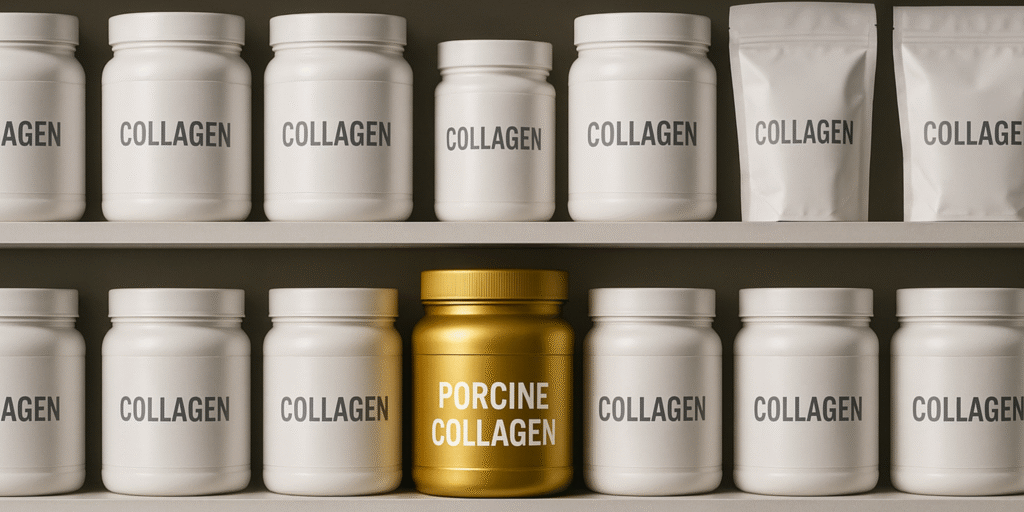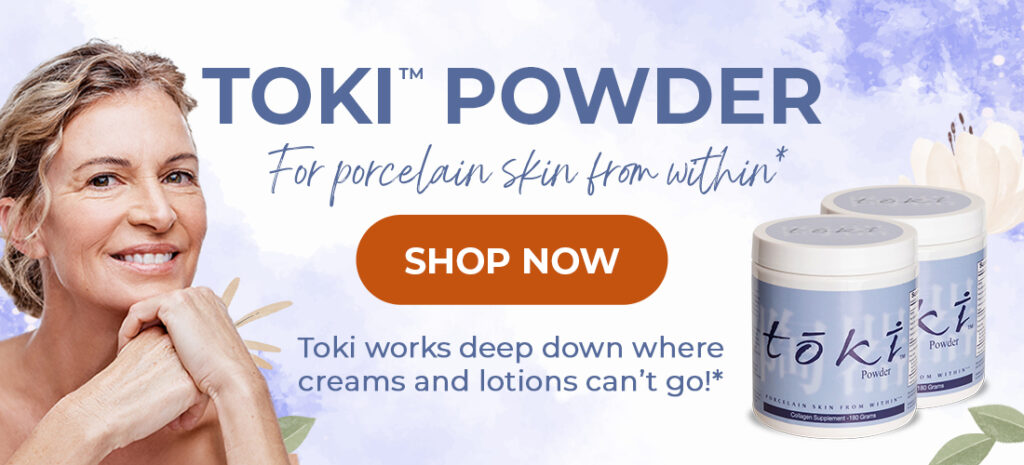Skin Health
Porcine Collagen: The Superior Collagen That Proves Not All Collagen Is Created Equal
Why Collagen Quality Matters
In the competitive world of wellness and beauty supplements, porcine collagen is gaining recognition as one of the most effective and bio-compatible options for supporting skin, joint, and connective tissue health. While many collagen products appear similar on the surface, not all collagen is created equal. Understanding the source of collagen is essential to making an informed, results-driven choice.
That’s why porcine collagen stands out—especially when compared to cheaper bovine, marine, or plant-derived alternatives. Its closer structural match to human collagen gives it a significant edge in absorption and effectiveness.

What Is Porcine Collagen and Why Is It Unique?
Porcine collagen is derived from pigs and contains mainly Type I and Type III collagen, which are critical components of human skin, bones, and connective tissue. These types are essential for maintaining elasticity, firmness, and overall structural integrity.
The key reason porcine collagen is valued is because its amino acid structure closely resembles that of human collagen, making it easier for the body to recognize and utilize. This structural similarity may result in more efficient incorporation into the body’s natural collagen framework.
By comparison:
- Bovine collagen, sourced from cows, also contains Types I and III but may have a different molecular configuration and variable quality depending on the source and processing.
- Marine collagen, typically from fish, is mostly Type I, with less overlap in structural function.
- Plant-based collagen boosters do not contain collagen at all; instead, they offer nutrients that may help stimulate the body’s natural production of collagen—but do not replace lost collagen directly.
How Porcine Collagen Compares to Cheaper Collagen Sources
Many lower-priced collagen supplements use bovine or mixed animal sources, which are often less standardized and sometimes inconsistently hydrolyzed. These variations can impact how well your body absorbs and uses the collagen.
In contrast, porcine collagen tends to offer:
- Greater bio-compatibility with human collagen types I and III.
- Higher absorption potential when hydrolyzed into smaller peptides.
- More consistent results, thanks to better standardization and source transparency.
- Fewer additives, as premium porcine collagen is typically offered in purer, cleaner formulations.
With cheaper collagen powders, what you save in cost you may lose in performance. These products may provide bulk protein but not the specific peptides or support nutrients needed for real benefits.
Why Bioavailability and Formulation Matter
Even the highest-quality collagen won’t help if your body can’t absorb it. Hydrolyzed collagen peptides—broken down into smaller, more digestible units—are ideal for this purpose. Porcine collagen, when hydrolyzed, is known for its excellent bioavailability.
This is where the combination of collagen type, hydrolysis, and formulation comes into play. Some high-quality collagen supplements also include cofactors like vitamin C, hyaluronic acid, or specific amino acids, which are known to support natural collagen production and help the body utilize supplemental collagen more effectively.
Cheaper collagen powders may skip these cofactors entirely, resulting in less efficient absorption and limited support for skin, joint, or connective tissue goals.
What to Look for in a Collagen Supplement
To choose the right collagen product, ask these questions:
- What is the source of collagen? Porcine collagen has one of the closest structural matches to human collagen.
- What collagen types are included? Look for Type I and III to support skin and structural tissue.
- Is it hydrolyzed? Hydrolyzed collagen peptides offer better absorption.
- Are cofactors present? Nutrients like vitamin C or hyaluronic acid improve effectiveness.
- Is the formulation clean? Avoid products with unnecessary fillers, or questionable sourcing.
While porcine collagen may cost more than basic bovine or marine options, its composition and performance often justify the investment.
Conclusion: Quality Over Cost
When it comes to collagen supplementation, not all sources are equal. Porcine collagen is closer in structure to human collagen, hydrolyzes well for effective absorption, and is typically included in formulations designed for real support—not just marketing.
Cheaper collagen products often prioritize quantity over quality, offering a bulk protein powder with little assurance of how well your body can use it. By contrast, porcine collagen brings a combination of bioavailability, structural compatibility, and formulation precision that adds up to meaningful support for skin, joints, and connective tissues.
If you’re serious about results, it’s worth remembering: you get what you pay for. And when it comes to collagen, porcine collagen proves that quality makes all the difference.
References
Like? Share with Your Friends!

